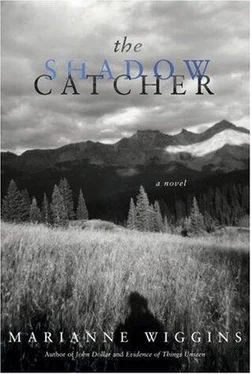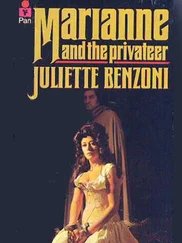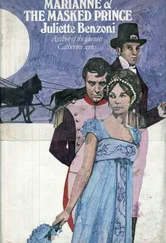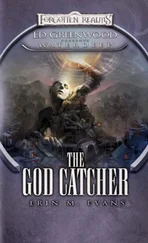Photography, the object of her father’s scorn.
How often had she heard him rail against its fakery, its allusions to the standards of high art? Any idiot could do it, he had said — by which he’d meant that any idiot smart enough to master the mechanics of the process could pretend to be a portrait artist — but no idiot had produced the images before her. Cyan —“Prussian blue”—a color on her father’s palette, a living light that vibrated in the eye — that was the color of these images, the color that saturated them. She couldn’t tell — she didn’t have the visual vocabulary to inform her eye — whether the cyan images had been laid on the surface of the paper or whether they existed in it, so inextricably did the color seem to be the image, and when she reached to touch one — an image of a man, possibly Modoc or Mopoc, sitting in a bark boat among reeds on a large body of water, most likely Puget Sound — she was surprised to discover by its touch that it was linen, and her mind went back to Edward’s assessing hand on her mother’s counterpane. She did not know — how could she? — that what she was looking at was the result of a chemical process, oxidation, like tarnish on a ring, and that the illusion of the Prussian blue inhabiting the fibers of the linen was as real as iron transmogrifying, iron becoming something else: as real as rust . She saw she was looking at an alchemy she’d never seen in quite this form before — a kind of magic she was slow to understand. There was something here, she slowly realized, looking all around at the photographs he’d pinned up on the wall — a decisive way of looking at the world with an aesthetic that rendered what was seen and what was real somehow more fragile and more beautiful than the way it must have looked outside the camera’s eye. There were landscapes he had captured no doubt on the heights of Mt. Rainier, of the treacherously raked volcanic scarps draped in snow and ice from a breathtaking altitude above the clouds hovering among the lower valleys, and she suddenly knew that not only was she looking at a real view of a real place that she would never have the stamina nor strength to capture for herself, but that Edward had climbed there with a camera on his back, this camera, this boxy incommodious contraption right in front of her that was as difficult to heft — she tried to lift it — as a crate of roosting hens. Was painting ever arduous? Certainly on the scale of Giotto’s murals or the painted ceilings in Italian churches, but nothing her father ever did, none of his canvases, suggested this degree of physicality or any sense of a physical exertion underpinning the image’s emotional affect. Edward had been there she couldn’t help but realize. That was something unique to photography, that a photograph elicited — that sense of being there — that painting more or less finessed. You could paint from your imagination — her father frequently had — but in order to produce a photograph you had to put yourself within a visual range, you had to be there and that locus carried with it its own intimacy. The photographer was acting for you with his eyes, acting as your own eyes would. It was a contract between the artist and the viewer that few painters could make and it was deeply personal, she saw, because she could not look at any photograph of Edward’s without thinking about Edward, himself, about the man behind the camera, about how and why he had positioned himself where he had. What he did when he made photographs was an adventure, she saw, it was adventurous — as well as beautiful — and what she learned looking at his photographs made her feel even more thrilled to know him, thrilled to have his company, to be called his Scout.
She closed the blind to his darkroom, closed the cubby door and exited the barn into the eerie filtered light she’d noticed before. Crossing the yard she heard hoofbeats and turned to find Asahel in the compound on horseback at a gallop with no buckboard behind him, nor, it would appear, a doctor. He dismounted and gripped her by the shoulders, his eyes begging the question to which she had to answer, he’s alive.
“Will he walk—?”
“I don’t know. Where’s the doctor?”
“Clara, don’t you know?”
“—know what?”
He turned her by her shoulders to face the sky over the trees to the east. A solitary ash, twirling on the current like a feather, fell before her eyes. Behind it the sky was smeared as if by charcoal.
“Seattle’s burning,” Asahel said.
“—Seattle?”
“The city is on fire.”
A memory of St. Paul with its brick and limestone monuments came to her mind.
“A city cannot burn,” she said.
“The waterfront, the piers, all made of wood — everyone for miles around has gone to help. Every doctor…”
She blinked. More ash fell around them, gray and black, like fatal pollen.
“—Hercules?” she sought.
“—he’s well taken care of, they’re turning the campground into a mission for evacuees. I’m off, myself, by boat, to help, as soon as I see Edward—”
He started for the barn.
“We carried him in here,” Clara corrected, pointing toward the house. “To my room. He may still be sleeping.”
“—Edward? — sleeping in daylight?”
A spark of understanding arced between them: it was unlike the man they knew to squander time.
“Pain,” Clara explained.
She waited in the kitchen while Asahel went to see his brother but he was back within the minute. “No point in waking him,” he said. He took her hand. “You two will be all right—?”
She nodded, though she didn’t meet his eyes.
“The Indians—?” she asked.
“They took to their canoes with the others of their tribe as soon as they saw smoke. Everyone, it seems, is rowing to Seattle to give aid.”
He gripped her shoulders again and she felt with dread that he might kiss her but instead he held his breath then let her go.
“Do you want my rifle?”
“Why—?” And then, “Certainly not.”
He seemed to entertain the idea to embrace her one more time but then he left, mounting the horse with less bravado than his brother might have, she couldn’t help herself from thinking, then he rode away.
She returned to Edward.
“Who was here?” he asked her, waking.
“Asahel. Seattle is on fire.”
He struggled to sit up.
“Show me,” he said.
“Too soon,” Clara intervened.
“I need to walk.”
“I know you do. I know it, Edward,” she said, smoothing the sheets around his legs. “But not now. We’ll do it slowly.”
He stopped her hands from fussing and pressed them to his thigh.
“—pain?” she asked.
“—better when you press, like this—” He renewed the pressure on her hands.
“Roll over…” She pulled the sheet away and leaned the full weight of her body on her hands on his hip.
He sighed.
“That’s better, Scout.”
He turned and looked at her across his shoulder.
“—promise me we’ll try to walk tomorrow?”
She nodded.
“Those poor people.”
“—who?”
“—in Seattle. You should see the way some of them live. Cheek by jowl.”
“I thought it was a wealthy city. Newly minted money.”
“What city is only wealthy—?”
She was reminded, briefly, of the novels her mother had made her read written by Dickens and the Frenchman, Balzac.
“I would never want to die by fire,” Edward said.
“What makes you think anyone is dying in Seattle?”
“I just told you.” Then on second thought he added, “Maybe there is no good way to die.”
“Together.”
“—what?”
Читать дальше











